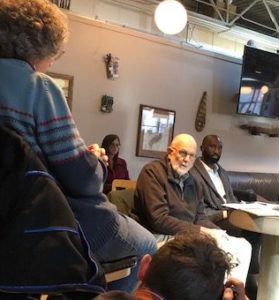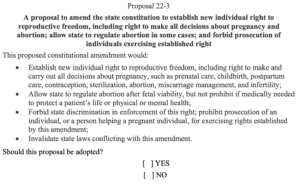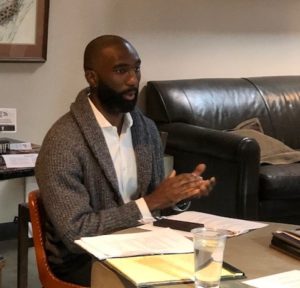By Jan Worth-Nelson
The entire goal of Proposal 3, the “Right to Reproductive Freedom Initiative” on Michigan’s Nov. 8 ballot, is “to restore Roe — nothing more, nothing less,” representatives from Reproductive Freedom for All (RFFA) declared in a panel discussion Saturday at Totem Books in Flint.
“Proposal 3 restores the protections we had under Roe v. Wade for the past 50 years,” Shanay Watson-Whittaker, RFFA deputy campaign manager said, speaking to a group of about 15 preparing to go door to door to make their arguments for the proposal.
Roe v. Wade was the 1973 decision that established a woman’s constitutional right to an abortion — a right overturned in June by the U.S. Supreme Court, which in the blockbuster Dobbs v. Jackson Women’s Health Organization 6-3 vote said reproductive rights would no longer be nationally guaranteed, but should be determined state by state.

Shanay Watson-Whittaker (Photo by Jan Worth-Nelson)
“I want to make sure that my daughters have the same rights that I have had,” she added.
In addition to Watson-Whittaker, the panel included Omari Young, M.D., a Flint obstetrician/gynecologist, and Jim Richardson, former director of Planned Parenthood of Genesee County.
Vanessa Hamilton, press secretary for the RFFA, moderated the panel.
The proposal applies to “All things related to pregnancy — let’s start from the beginning,” Hamilton summarized: “preconception consult, contraconception care, prenatal care, child birth, postpartum care, infertility treatment, miscarriage care…these things all relate to pregnancy, — even sterilization for a woman, which could mean having your tubes tied or a hysterectomy.
“It has nothing to do with anything else except the things related to a woman’s pregnancy. Full stop.” she said.
Women’s health care is not political, the panelists emphasized repeatedly: reproductive health care for women is nonpartisan.
Omari Young, M.D. (Photo by Jan Worth-Nelson)
Proposal 3 would “invalidate an outdated 1931 Michigan law that bans abortions,” RFFA’s materials point out, and “If left in place, that law will create significant and dire consequences for Michigan women and their families and could make abortion illegal in our state.”
An overview including opposing arguments are summarized here, in a September piece in Bridge Michigan.
Addressing what he suggested is the “stigmatization and other-ism” of some aspects of reproductive health care, Young said some try to connect contraception issues with “promiscuous” women, “women who they think don’t make right decisions,”
But in reality, he said, “Contraceptive care sees no ethnicity, sees no age, sees no race, sees no religious background or political affiliation — it touches every woman’s life, no matter their background, their wealth, whether they’re from Flint, Grand Blanc — we all know a woman in our life who needs reproductive health care.”
“Speaking solely as a medical provider,” Young stated, “My counsel for my patients, my goal is for you to come away empowered, informed — and you should understand the care that’s being offered.
“Reproductive health care is all encompassing — and has one goal: to assure safe outcomes for women. Abortion care is often highlighted, but it also includes pregnancy care, prenatal care, postpartum care, reliable contraception, infertility treatments,” he stressed.
Panel members strongly contested some of what they said opponents to Proposal 3 are arguing.
“You’re hearing a lot of other things that it does — flatly false,” Hamilton said. For example, she said the proposal has nothing to do with abridging parental consent for minors, or gender reassignment/transitioning counseling.
“They are not in the proposal — these things are simply made up.”
One strong opponent of Proposal 3 is the Catholic Church, which offers its case here.
“It is NOT a sinister proposal — it helps women, it helps families stay afloat and helps them make decisions about themselves — no one should be able to do that for them,” Hamilton said.
The proposal will not change anything about parental consent, Young reaffirmed. The same parental consent laws that existed under Roe will be untouched. The “gestational limits” provided under Roe would still be in place. (The term “viability” is used, Young noted, and generally regarded as 21-23 weeks)
Professional standards for delivering reproductive health care under the proposal would be the same as in the Roe era — a far cry from the dangerous conditions women faced pre-1973.
“Read the language,” Hamilton advised. [See below for the ballot text of the proposal] When you vote Nov. 8, read the ballot, I guarantee you there will be no language about gender transition — it is simply made up. It is not there. It doesn’t exist: they are quite literally inventing it.”
“If it didn’t happen under Roe v. Wade, it won’t happen under Proposal 3. It will not change.” Watson-Whittaker said.

Jim Richardson addressing a group of Proposal 3 advocates at Totem Books (Photo by Jan Worth-Nelson)
“The arc of this fight is very long,” Richardson said. He recalled how when he and his wife Jane married in 1963, they had to take her birth control prescription to another state because of restrictions in their own state. He fears a return to those kinds of restrictions.
“It is just plain wrong that women have been under the control of legislators about what happens to them,” he said.
“We now have a rare opportunity to establish within the Michigan constitution the right to reproductive freedom — it’s rare that we have this opportunity. Success hinges on the turnout of voters. Our time is now. Absolutely now.
“I’m concerned if we don’t succeed now it will be multiple years before we have this opportunity again.”
“Stick to the facts,” Young urged. “Look at the proposal itself — it is clear and simple. Don’t get distracted by the outside noise. Its goal is to restore protections women have had since 1973.”
“When you start your cycle, you are starting your reproductive health care — for your entire life — and we can’t allow it to be stripped from us,” Hamilton stated.
“We have the power to take reproductive care back into our own hands.”
As the discussion wrapped up, Young summarized that Proposal 3 attempts to carry on “the essence of Roe v. Wade — that every woman has a right to make their own decisions about their reproductive health care.”

EVM Consulting Editor Jan Worth-Nelson can be reached at janworth1118@gmail.com.



You must be logged in to post a comment.